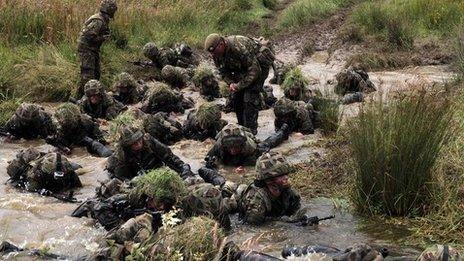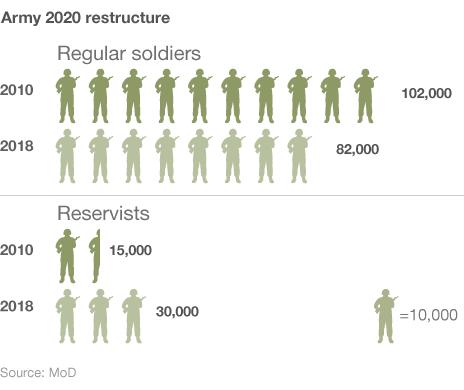Armed forces 'vulnerable' to gaps in specialist staff
- Published

Defence Secretary Philip Hammond has said recruitment is a "big challenge"
Shortages of specialist personnel in the Army and Royal Navy are leaving the military "vulnerable", MPs have warned.
A lack of nurses, nuclear safety engineers and airworthiness certifiers are among those highlighted in a report by the Commons Defence Committee, external.
Financial incentives should be offered to retain current staff, it argued.
Ministers said the restructuring of the armed forces had led to "temporary shortages" in some areas but front-line operations were being protected.
The cross-party committee said the number of "pinch-point trades" - specialist jobs where there are insufficient personnel to meet operational requirements - had risen from 19 to 26 in the Army and 11 to 15 in the Royal Navy between 2011-12 and 2012-13 - although there was only one in the RAF.
According to the Ministry of Defence's 2012-13 report, jobs where there is a 40% shortfall of staff include:
emergency nurses
anaesthetists
radiologists
hydrographic surveyors
intelligence operators

There is a shortage of dog handlers in the army
There are shortages at nearly all levels of the Intelligence Corps, from the rank of private to major, while there are also shortfalls of bomb disposal operators, dog handlers, veterinary officers, interrogators and qualified engineers.
The committee said it was particularly worried about shortages of medical specialists available to be deployed in field operations.
While it noted that there was also a general shortage of such qualified staff in the NHS, it found they were particularly hard to replace in the armed forces because of their technical experience and qualifications.
While issues of manpower and recruitment were delegated to the three services, it said the Ministry of Defence could assist by providing additional funds to retain or recruit in key personnel, such as nuclear technicians.
"The Ministry of Defence should support the services in addressing shortages in pinch point trades - key shortages which leave the armed forces vulnerable now and in the future," it said.
James Arbuthnot, the Conservative MP who chairs the committee, said he was worried "about how seriously these shortages really are taken" by officials.
Substantial cuts to the regular armed forces, which will eventually reduce total army personnel from 102,000 to about 82,000 while aiming to increase the number of reservists from 19,000 to 30,000, have proved controversial.
Earlier this week, the Army launched a £3m promotional campaign in an effort to recruit new regulars and reservists.
'Vital roles'
A poll commissioned by the Army to mark the campaign's launch suggested that 23% of serving personnel were not satisfied with their current career.
In their report, the MPs raised concerns about the number of military personnel choosing to leave voluntarily, which is above the long-term average at 4.1% for officers and 5.8% for other ranks.

There are currently 19,000 trained reservists
They suggested that repeated tours of duty without breaks may be "exacerbating" problems with morale.
It said figures in the MoD's annual report showed the so-called "harmony guidelines" - the recommended maximum amount of time spent away from home - had been breached 5.1% of the time in the Army in 2012-3 and 3.7% in the RAF.
The figure was much lower, at 0.6%, for the Royal Navy.
The MPs said such breaches were "unsatisfactory" and the government should set out a plan to ensure they did not happen at all in future.
'Right skills'
Labour said the shortfall in key posts was "worrying" and urged Defence Secretary Philip Hammond to act on the report's recommendations.
"They are vital roles needed to support our armed forces and keep Britain safe and secure," said shadow defence secretary Vernon Coaker.
The Ministry of Defence said it was confident that the UK had the "right personnel with the right skill sets to satisfy all strategic defence priorities".
"The armed forces are going through significant restructuring resulting in a small number of temporary shortages in some roles," a spokesman said.
"However, there are safeguards in place to ensure front-line operational capability is not affected."
- Published11 January 2014
- Published11 January 2014
- Published3 July 2013